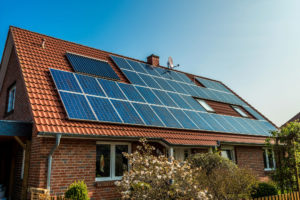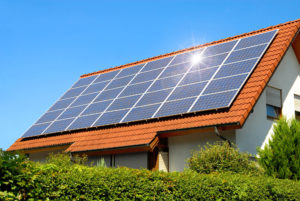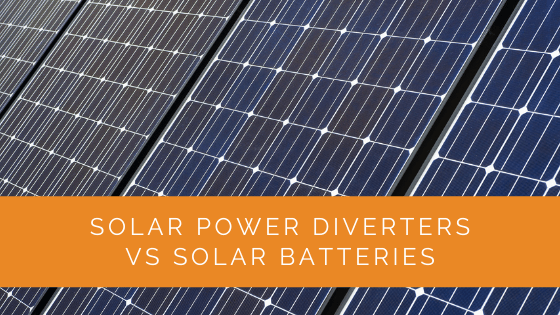In the pursuit of harnessing the boundless power of the sun, homeowners and businesses alike are faced with an important choice: Solar Power Diverters or Solar Batteries. In this informative exploration, we dive deep into these two ingenious technologies revolutionising how we utilise solar energy. Solar power diverters, those clever devices attached to solar PV systems, hold the promise of heating your water supply with surplus electricity, while solar batteries, as the name suggests, offer a robust solution for storing and utilising solar energy in various ways. Join us as we uncover these two game-changing options’ differences, functions, costs, and benefits, ultimately guiding you towards a more sustainable and cost-effective energy future. Whether you aim to optimise your hot water supply or reduce your reliance on the grid, we’ve got you covered. So, let’s shed light on the Solar Power Diverters vs Solar Batteries debate and help you make an informed choice that suits your needs and empowers your journey into the world of solar energy.
Contents
- 1 Key Takeaways
- 2 Solar Power Diverter Definition
- 3 Solar Battery Definition
- 4 Solar Power Diverter Functions for Immersion Heater
- 5 Functions of Solar Batteries for Home Appliances
- 6 Which Costs More: Solar Batteries or Diverters?
- 7 Case Study: Comparing Solar Power Diverters and Solar Batteries for Optimal Energy Efficiency
- 8 Expert Insights From Our Solar Panel Installers About Solar Power Diverters vs Solar Batteries
- 9 Discover the Power of Solar with Solar Panels Network
- 10 The Bottom Line – Which Should You Choose?
Key Takeaways
- Solar power diverters and solar batteries offer different ways to utilise excess solar energy.
- Solar power diverters divert surplus electricity to heat water, helping save energy bills and extending feed-in tariff benefits.
- Solar batteries store excess solar energy for later use, powering household appliances and potentially earning money through feed-in tariff payments.
Solar Power Diverter Definition
Solar power diverters are devices attached to solar PV systems that can help redirect the surplus power. You can technically divert more energy to electrical appliances through a solar diverter. This device will only transfer the surplus electricity to your house’s heating system.
Usually, a power diverter can transfer the surplus energy generated to an immersion heater in your heat pump, electric heater, or other hot water-generating device.
Ideally, you can “literally” heat your water supply and get solar hot water from such devices. In some cases, solar diverters are also known as solar PV optimisers. So, it allows you to store your green energy without spending excessively on the grid.
It helps save energy generation costs by diverting extra energy into a hot water tank. However, once the desired electricity requirement is reached, the solar PV system will automatically send it to the national electrical supply.
It means your feed-in tariff will not decrease even if you use a solar power diverter to generate hot water. So, solar panels will give you 50% of the energy you generate.
Note: A solar power diverter will last up to 10 years with constant usage of your solar system.

Solar Battery Definition
In its essence, a solar battery is what the name suggests. It is a cost-effective battery system and stores sufficient power in emergencies. Getting a solar battery makes sense if you are interested in generating energy from solar PV panels. Through the help of this battery, the electricity generated from solar panels will be stored and used during certain conditions.
The generated solar power will remain in the battery till its total capacity. Your home will start using this power when the energy gets used up from the solar panel inverters. Unlike a power diverter, a solar battery can charge all your household appliances, including your fridge and TV.
What Happens on Full Charge?
Once you have reached the total capacity of your solar power battery, the excess energy created will get transferred to the grid. Therefore, you will have the chance to gain some money through the feed-in tariff payments scheme.
Note: Solar batteries usually last 5 to 15 years with constant usage.
Solar Power Diverter Functions for Immersion Heater
Solar power diverters effectively save energy from solar panels and generate hot water from your heat pump. If you get a high-end machine, it will automatically monitor the energy usage in your home and compare it with solar panel energy generation. It will then analyse whether more energy is getting produced or not. Then, instead of sending it back to the grid, most of the power will get diverted to your water heater.
Due to this, it meets your hot water heating requirements by sending the excess electricity to your immersion heater in the hot water tank. Now, the hot water cylinder in the consumer unit gets charged and heated free of cost.
This free energy will help save energy bills during the winter as you try to use grid electricity for hot water. In some cases, the solar power diverters can power appliances when your home requires the energy, or it will be sent to the heater on priority. Due to technical advancements, you can now use solar thermal energy without worrying about extra costs for water supply.
Note: If you do not own an export meter, you must send the excess electricity to your immersion because the government will only pay 50%.
Functions of Solar Batteries for Home Appliances
Do you know how much energy your PV panels generate? On average, the UK weather allows people to generate 700 to 900 kWh from a 1KW panel annually. Around most of it becomes excess power and gets you 50% of the feed-in tariff.
Even with the promised government payment, most UK households rely on solar batteries to save solar energy and reduce overall costs. Ideally, the surplus solar energy gets a different treatment than a diverter.
The first step in the process involves the charging of the solar battery. In doing so, the battery will store the electricity your household appliances use when the solar panels fail to produce electricity.
You will need it to get “off” peak rates from the national electrical supply. However, the moment your battery gets ultimately charged, it gets sent to the National Grid. In a way, you can save much more energy when using your heat pumps and other appliances.
One downside about solar batteries? You need to contact a supplier to get energy for your home once it runs out of the charge.

Which Costs More: Solar Batteries or Diverters?
Solar batteries cost more than diverters due to the diverse functions they offer. On average, a solar battery will cost £500 to roughly £5,400, excluding the installation price.
Tesla Powerwall 2.0 is one of the best solar batteries available in the UK market, with a capacity of 13.5kW. On the other hand, diverters have a reasonably low price range. You can get a good quality diverter to generate free hot water for £320.
The lowest price for this device is £199, excluding the installation cost. Indeed, they are the cheaper options but can get complicated to install. It can either be a consumer unit connection or require professional help for installation.
Solar iBoost+ is one of the best immersion diverters in the UK, with an average cost of £300. The Solar iBoost+ is a reasonably new addition to the market but has promised great things in the future. It can intelligently control the heating system in your home.
Benefits of Using Both with Solar Panels
The benefits you can reap from both of these technologies usually overlap and interconnect in various ways:
- Both can reduce your energy bills drastically
- You can export less to the National Grid
- Your buying requirement for energy from suppliers diminishes
The diverter will take the load off your boiler and give you free hot water. The solar battery will provide energy during a blackout or sudden rains.
Diverters model after a 100% efficiency module like the solar batteries. However, these batteries will need maintenance, unlike the diverters. For example, you should regularly boost your batteries and keep them charged while ensuring an optimum temperature. Also, solar batteries in the UK have a better warranty period.
It might be challenging to choose the right one for your home. But either one would work great with the UK weather. It all boils down to your panels’ efficiency, needs, power usage, and affordability.
Case Study: Comparing Solar Power Diverters and Solar Batteries for Optimal Energy Efficiency
Background
At Solar Panels Network, we specialise in providing tailored solar solutions that maximise energy efficiency and savings. Recently, we worked with a residential client in the UK who sought to optimise their solar energy use. They were considering either a solar power diverter or a solar battery to manage their surplus energy more effectively. Our goal was to determine the best solution to meet their energy needs and financial goals.
Project Overview
The client was particularly interested in understanding the benefits and limitations of both solar power diverters and solar batteries. They aimed to reduce their reliance on the grid, lower their energy bills, and make the most of their solar PV system’s output. We set out to provide a comprehensive analysis and recommendation based on their specific energy consumption patterns and budget.
Implementation
- Energy Audit: Conducted a detailed energy audit to assess the client’s daily and seasonal energy consumption, focusing on peak usage times and surplus energy generation.
- Cost-Benefit Analysis: Performed a financial analysis comparing the initial costs, potential savings, and long-term returns of installing a solar power diverter versus a solar battery.
- System Compatibility Check: Evaluated the existing solar PV system’s compatibility with both technologies, considering factors like system capacity and current energy infrastructure.
- Client Consultation: Discussed the findings with the client, highlighting the practical benefits and limitations of each option in relation to their specific needs.
Results
- Optimised Energy Use: The solar power diverter proved ideal for diverting excess energy to heat water, leading to immediate savings on heating bills. The system efficiently utilised surplus solar energy without complex installations.
- Enhanced Energy Independence: The solar battery offered broader benefits, including backup power during outages and the ability to store energy for nighttime use. Although the upfront cost was higher, the potential for energy independence and reduced reliance on the grid made it a compelling option.
- Client Decision: Ultimately, the client chose the solar battery for its versatility and long-term financial benefits, valuing the peace of mind it offered during grid outages and its potential for significant energy savings.
Summary
This case study underscores the importance of a tailored approach when choosing between solar power diverters and solar batteries. Both technologies offer unique benefits, but their suitability depends on individual energy needs and financial goals. For our client, the solar battery provided a comprehensive solution for energy storage and independence, while the diverter offered immediate, cost-effective benefits for water heating. Solar Panels Network remains committed to guiding our clients through these critical decisions, ensuring they achieve optimal efficiency and savings from their solar investments.
Expert Insights From Our Solar Panel Installers About Solar Power Diverters vs Solar Batteries
Choosing between solar power diverters and solar batteries depends largely on your specific needs. If you’re looking to maximise the use of surplus energy for hot water, a solar diverter is an efficient and cost-effective option. It’s a straightforward solution for those not ready to invest heavily but still want to see tangible benefits from their solar system.
Solar Technology Specialist
Solar batteries, on the other hand, offer a broader range of uses. They not only store excess energy but also provide backup power during outages. While the initial investment is higher, the long-term benefits, including energy independence and potential financial returns from feed-in tariffs, can make them a valuable addition to your solar setup.
Senior Renewable Energy Consultant
Understanding your energy consumption patterns is key. For households with consistent electricity usage throughout the day and night, solar batteries can be a game-changer. They ensure you utilise stored solar energy even when the sun isn’t shining, offering greater control over your energy use and costs.
Lead Solar Installation Engineer
Discover the Power of Solar with Solar Panels Network
Are you navigating the world of solar installations? Look no further than Solar Panels Network, the UK’s trusted partner in harnessing the sun’s potential. Our dedication goes beyond just installations; we’re on a mission to transform how homeowners and businesses across the UK perceive and utilise energy. By choosing us, you’re reducing your carbon footprint and making a smart financial move that promises savings for years ahead. Contact us today and embark on your solar journey.
The Bottom Line – Which Should You Choose?
Do you want a solution to your heating water problem, or maybe you want to take advantage of sending less energy back to the grid? Either way, you need to install a solar power diverter or a solar battery to save on the electricity generated from your PV system.
One thing to note is that you cannot get off the grid with the help of either of these technical options. Instead, it will take you in the right direction towards self-sufficiency and saving the electricity produced.
If you want to optimise your heat options for your water at a lower cost, choose a diverter. On the other hand, solar batteries are more powerful and diverse but have a higher price point in the UK. You can choose between Solar iBoost or Tesla Powerwall to help you make the most of solar energy.
Given the unpredictability of the UK weather, solar batteries would be a wiser decision as solar panels produce half of their capacity during rains. Similarly, it can store more energy but requires extra maintenance. Even then, these technologies have varied usage but can provide the same result – maximum savings on your energy bills.
Are you ready to go green and make the most of solar energy from your solar system?
About the Author
Solar Panels Network stands at the forefront of solar energy solutions, driven by a team of seasoned solar engineers and energy consultants. With over decades of experience in delivering high-quality solar installations and maintenance, we are committed to promoting sustainable energy through customer-centric, tailored solutions. Our articles reflect this commitment, crafted collaboratively by experts to provide accurate, up-to-date insights into solar technology, ensuring our readers are well-informed and empowered in their solar energy decisions.

